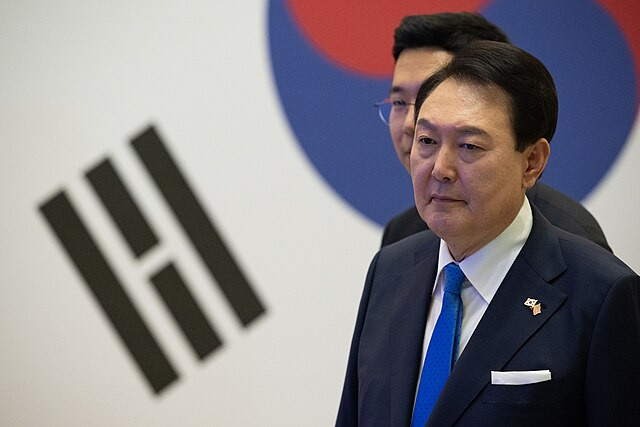South Korean authorities arrested impeached President Yoon Suk Yeol on Wednesday in connection with insurrection charges stemming from his martial law declaration on December 3, marking a dramatic escalation in the nation's political crisis. Yoon's arrest represents the first time a sitting South Korean president has been detained, underscoring the gravity of the allegations against him.
In the early hours of the morning, a motorcade was seen departing Yoon's heavily guarded residence in the hills of Seoul. Authorities, bolstered by more than 3,000 police officers and anti-corruption investigators, breached the compound after facing resistance from Yoon's supporters and members of his ruling People Power Party. Some demonstrators clashed with police, tearfully protesting what they claimed was an unjust attempt to humiliate the embattled leader.
The arrest follows weeks of heightened tensions after Yoon's unprecedented martial law declaration, which he justified as a necessary measure to defend the nation against "North Korean communist forces" and "antistate elements." Critics have denounced the move as a power grab that plunged South Korea, a beacon of democracy in Asia, into political uncertainty. Parliament overwhelmingly voted to impeach Yoon on December 14, suspending him from office and transferring his powers to an interim leadership.
Investigators sought an arrest warrant after Yoon failed to appear for questioning. A Seoul district court approved the warrant on December 31, extending its validity after initial delays in executing the order. Yoon's legal team argued that his detention was politically motivated and lacked merit.
The insurrection charges leveled against Yoon are significant, carrying the possibility of the death penalty under South Korean law. Observers note that the case could set a precedent for holding high-ranking officials accountable, challenging the long-standing tradition of presidential immunity.
Yoon's martial law declaration last month was South Korea's first in over four decades and evoked memories of the nation's authoritarian past. His late-night announcement, broadcast unexpectedly, claimed the need to protect national security. However, lawmakers swiftly condemned the measure and gathered to repeal it, forcing their way past police barricades to vote down the decree. Days later, they initiated impeachment proceedings.
The Constitutional Court is now tasked with deciding whether to uphold the impeachment and permanently remove Yoon from office. Proceedings began on January 14 but were adjourned to January 16 after Yoon failed to attend. The court's decision could have far-reaching implications for South Korea's political stability and governance.
Yoon's dramatic fall from power has sparked widespread debate in South Korea, where former leaders have faced legal scrutiny after leaving office but rarely during their tenure. His arrest follows a failed attempt by investigators to detain him earlier this month, when his security team blocked access to his residence.
Supporters of Yoon have continued to rally, accusing his opponents of weaponizing the legal system to undermine his presidency. Meanwhile, opposition figures and civil society groups argue that the arrest is a necessary step to uphold the rule of law.






